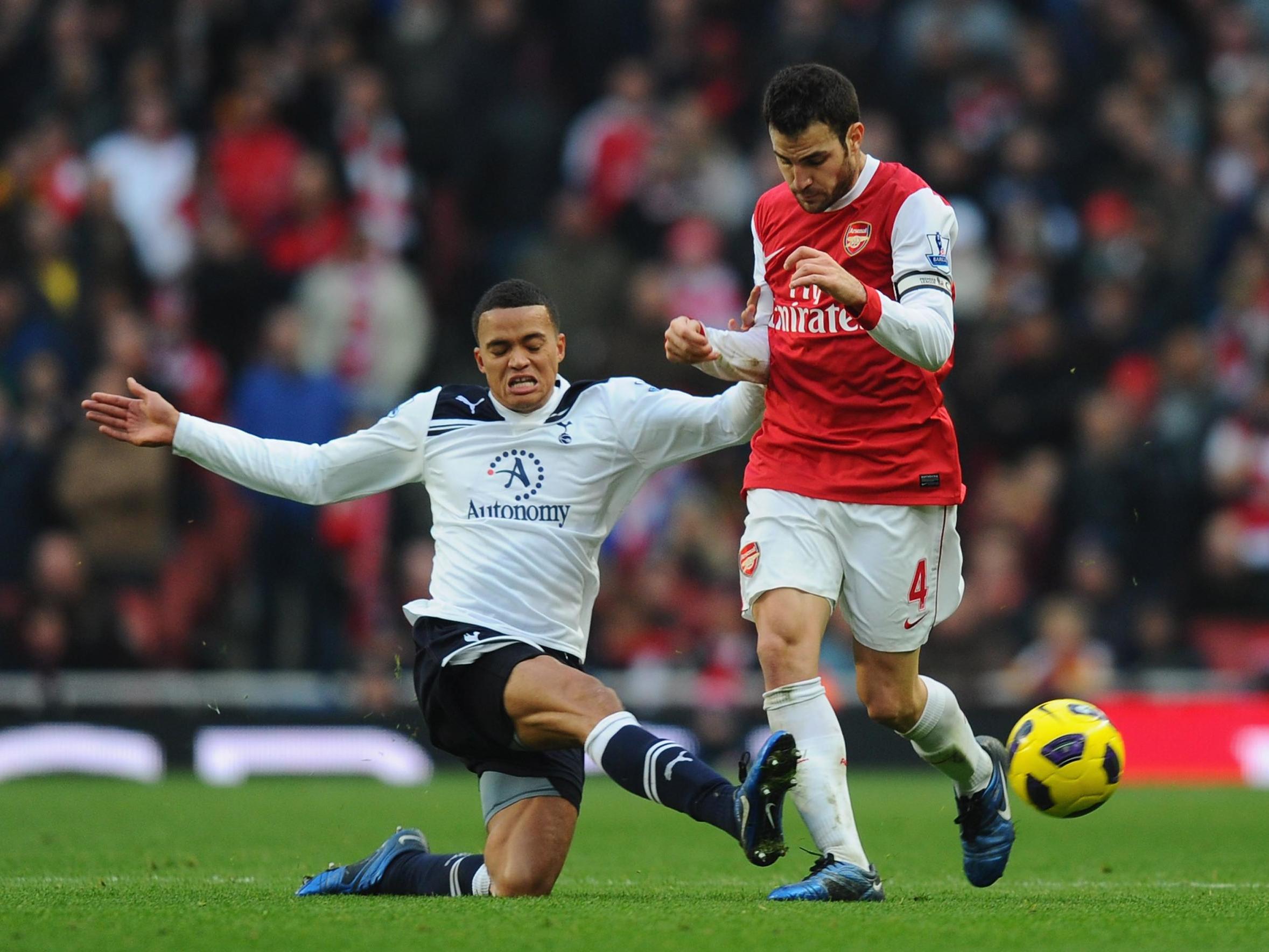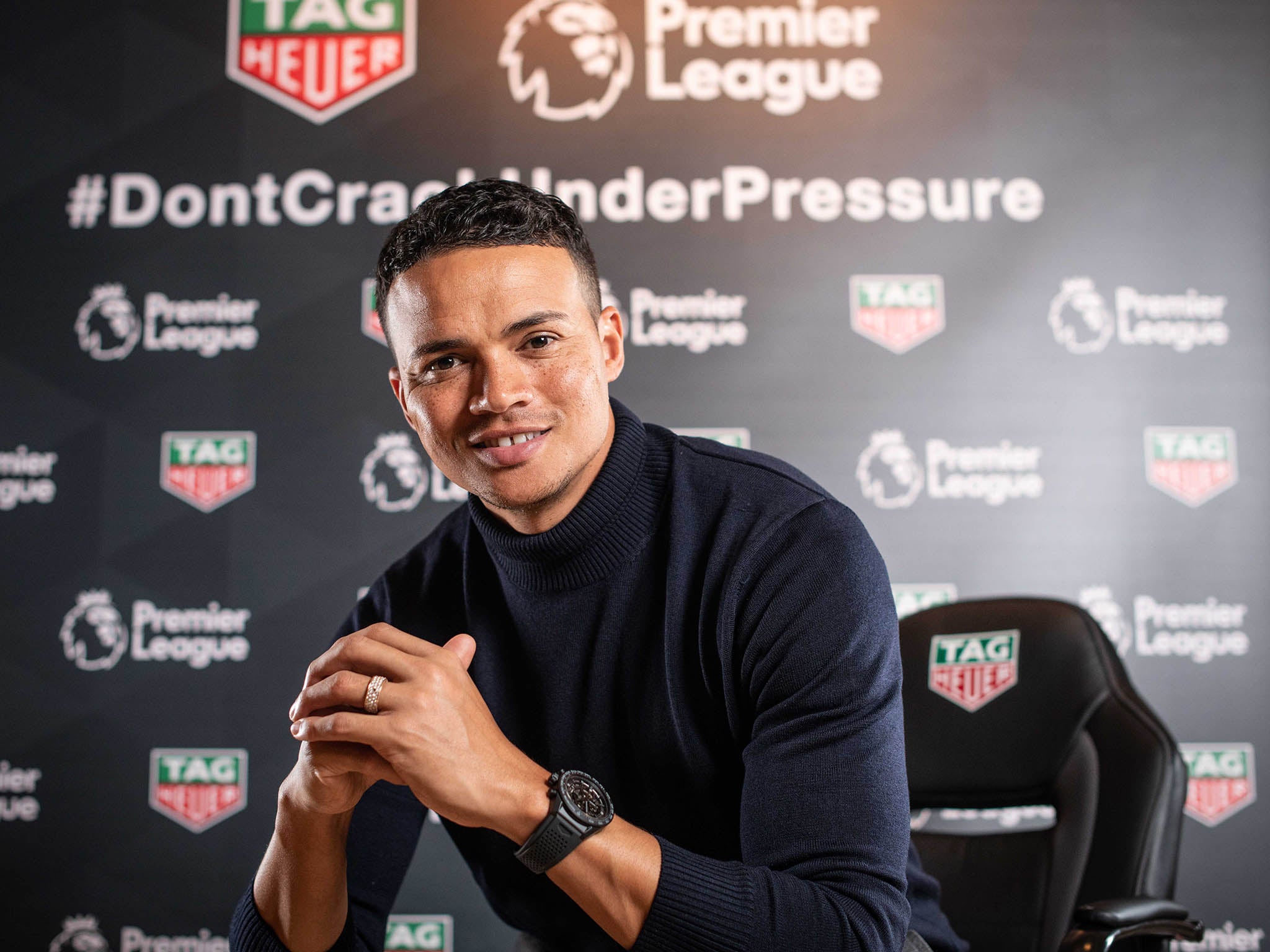Jermaine Jenas: Tottenham are now the more powerful team within north London
Exclusive interview: The former midfielder opens up on Tottenham's rivalry with Arsenal, the changing of the guard and Mauricio Pochettino's magic touch

Your support helps us to tell the story
This election is still a dead heat, according to most polls. In a fight with such wafer-thin margins, we need reporters on the ground talking to the people Trump and Harris are courting. Your support allows us to keep sending journalists to the story.
The Independent is trusted by 27 million Americans from across the entire political spectrum every month. Unlike many other quality news outlets, we choose not to lock you out of our reporting and analysis with paywalls. But quality journalism must still be paid for.
Help us keep bring these critical stories to light. Your support makes all the difference.
For around seven or eight years, Arsenal v Tottenham had a decent claim to being the most compelling fixture in English football. Between 2004 and 2012, the north London derby produced an average of more than four goals a game, as well as a clutch of unforgettable moments. Martin Jol and Arsene Wenger rucking on the Highbury touchline. Tottenham’s cathartic 5-1 thumping in the League Cup semi-final. The spectacular 4-4 draw in 2008. A remarkable Spurs comeback at the Emirates in 2010. Arsenal’s two 5-2 demolitions in the space of nine months.
And as north London’s red and blue halves prepare to meet each other again this Sunday, it feels an appropriate time to gather the memories of one of the main protagonists of that era. Jermaine Jenas hung up his boots long ago and carved out a successful second career as a television and radio pundit. But in a way, he played his own quietly significant role in establishing the present-day terms of a rivalry in which, in terms of stature and ambition, Arsenal and Tottenham feel like genuine equals.
It wasn’t always that way, of course. When Jenas arrived at Tottenham from Newcastle in 2005, there was little doubt where they stood in the pecking order. While Wenger had led Arsenal to three Premier League titles playing the sort of football that seemed to stretch the very boundaries of the game, Tottenham had spent more than a decade bumbling along in the anonymity of mid-table, with only the occasional nerve-shredding relegation battle to break the tedium.
But in a way, that 2005-06 season was the turning point. An exciting young side with a strong English core – Jenas, Ledley King, Michael Carrick, Aaron Lennon, Paul Robinson, Jermain Defoe – came brutally close to edging out Arsenal for fourth place. An ill-tempered 1-1 draw at Highbury is perhaps best known for Jol and Wenger squaring up during the second half, angrily jabbing fingers at each other. “I missed that game with a stress fracture in my shin, but I remember watching it and thinking: we’re battering them, we’re all over them,” Jenas remembers. “Azza was causing absolute havoc. We had a good team that year, and just fell short. It was the one that got away.”
Nevertheless, a precedent had been set. Arsenal retained the edge, with their superior squad and proven pedigree, but Tottenham had shown they could give them a decent fight. “They were a better side than us,” Jenas admits. “They had better individuals, were drilled better than us as a team, playing Champions League football, challenging for league titles.
“But a lot of the time, we managed to get something. The thing is, Arsenal just wanted to pass it around and have a lovely day. We could pass it too, but we could also switch mode and make it horrible. Get about them. Hit them with a few tackles. And sometimes they faded out a bit. And the reason we had so many famous results against had a lot to do with that.”
By way of illustration, Jenas brings up a game the following season, in which Spurs were outplayed for much of the afternoon, only for Jenas to pop up in the 94th minute with a screaming equaliser to claim a 2-2 draw. “That was a game we should have got absolutely nothing out of,” he explains. “They battered us for most of it. But we hung in there. And that was the basis of how we got results against them a lot of the time: the belief that eventually, they were going to crack and give us something.”

The next season, Tottenham steamrollered Arsenal 6-2 on aggregate in the League Cup semi-final, with Jenas scoring in both legs. The season after that, in Harry Redknapp’s first game in charge, it was Jenas’s 89th-minute goal to narrow the deficit to 4-3 that paved the way for Lennon’s stunning equaliser just seconds later. A golden rivalry was emerging, in which Arsenal could feel the hot breath of their neighbours at their backs, and didn’t entirely enjoy it.
How well did the players get on around that time? “Not very well,” Jenas replies. “As I say, Arsenal were the better side. But they moaned a lot. They used to complain all the time, crying for decisions. You couldn’t even pick out a couple. It was all of them. That used to annoy us a lot. Over a number of years of going through these games, you started to develop a natural dislike on the pitch.”
What a curate’s egg of a Tottenham side it was in those days: a mixture of raw potential, unimaginable talent and players you can scarcely believe ever wore the shirt. Players from the 2008-09 squad, for example, would go on to win four league titles and eight Champions Leagues between them. But while the likes of Gareth Bale, Luka Modric and Dimitar Berbatov were clearly made for the biggest stage, not everyone would join them there. “Some went on to be great,” Jenas says. “Some were destined to be great, but fell short, whether through injuries or lack of belief. Someone like Adel Taarabt should have been a world beater. But something within him broke down.”
By the time Tottenham came 2-0 down to beat Arsenal 3-2 in 2010, the first time Jenas feels he travelled to the Emirates with the genuine belief Tottenham could win rather than hang in, there was already some idle talk of a changing of the guard in north London. In reality, though, that was still years off. Not until 2017, long after Jenas and most of his team-mates from that era had retired or moved on, did Tottenham finally finish above Arsenal in the league. It would take the influence of Mauricio Pochettino and a new Spurs generation to finally overhaul their oldest rivals.

“That’s the biggest thing that Poch has brought to Tottenham,” Jenas says. “He’s brought the mentality that they’re no longer just a decent team or a good team, but a team striving to win things. To challenge for league titles, to win major honours, to go far in the Champions League. And not just over one season, but a number of seasons. The players have bought into that.
“There’s no doubt in my mind that there’s been a swing. Spurs are now the more powerful team within north London, and have been for the last couple of years. I’ve seen Tottenham go to the Emirates in their lowest moments, with their weakest teams, and Mauricio still manages to pull a rabbit out of the hat. He’s the special ingredient. I interviewed him for The Premier League Show a couple of years ago, and he’s a very humble guy. Obsessive, hard-working, thorough in everything that he does.”
For Arsenal’s part, Jenas believes they too will be in the mix again before long. “All the signs are very good,” he says. “Given a bit more time, Unai Emery will have the team challenging for the top four next year.” And so perhaps a new golden age of the north London rivalry is in the offing, one in which – thanks in no small part to the efforts of Jenas and his generation – these two great clubs now meet each other not from either side of a great gulf, but on the same level, staring each other squarely in the eyes.
Jermaine Jenas was speaking on behalf of TAG Heuer, Official Timekeeping Partner of the Premier League, to promote the TAG Heuer Premier League Pressure Test.
Join our commenting forum
Join thought-provoking conversations, follow other Independent readers and see their replies
Comments